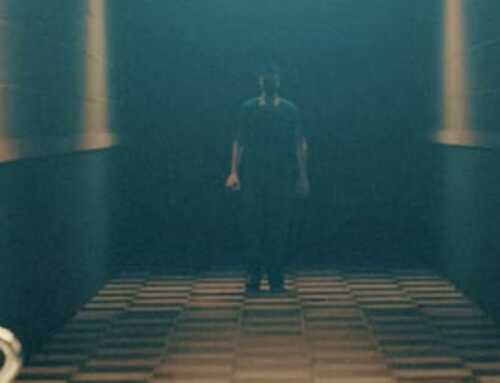Written and directed by Keishi Kondo, New Religion is a narratively dark but visually beautiful feature film selected for screening at the 2023 Slamdance Film Festival. Its small but mighty cast was a pleasure to watch, along with Kondo’s masterful framing and measured approach to revealing what lies beneath the surface of her characters. The horrors of this film are not at first apparent but they are dark in nature and emotionally gut-wrenching.
Miyabi lives as a callgirl, working for an escort service since the tragic death of her daughter. Though she lives with her boyfriend, she also lives with the constant reminder of her passed daughter, as she continues to live in the apartment where she died. One evening Miyabi’s coworker is called to meet a usual client, however soon after, her coworker goes on a killing spree and then immediately disappears. Miyabi is assigned to that same client, a recluse with a penchant for photography, who only asks to take pictures of her body parts. The more photographs that Miyabi gives, the more she seems to picture her daughter, falling into a psychosis where her dreams become blurred with her reality. Though Miyabi’s boyfriend and her driver attempt to understand what is happening, the final events occur as planned from its mysterious and sinister beginning.
Life can change in an instant; one moment someone can be a mom, and the next they are not. It’s a bleak occurrence experienced by the protagonist, Miyabi, portrayed in a heartbreaking performance by doe-eyed Japanese actress Kaho Seto. New Religion is beautiful inside and out — it delicately handles heavy themes, such as death and grief. I felt that the film had the ability to coax me in with the anticipation of clues as well as the oddity of its surrealness, but the film also held me at arm’s length, keeping its mystery a secret until the very last turn of events. It was a slow build to the revelation, but not necessarily a slow pace. In any case, New Religion, among many things, boasts a serial killer worthy of psychological study as much as Norman Bates and Dr. Hannibal Lecter — he was all at once unassuming but also intimidating and menacing.
New Religion is a feast for the senses — visually alluring, auditorily raw, and engrossing enough to taste, touch, and smell its setting through the screen. New Religion constantly calls reality into question, but the mind tricks are sometimes a relief as opposed to the stark realities faced within the film. Any violence or otherwise uncomely event is just out of sight, hidden behind a frame that never comes but that the audience instead has to fill in with their imagination. I did not miss the violence in this film, it was not needed as New Religion instead relied upon its compelling story. This movie has angles for days, with shots from different sides keeping the film visually interesting. The framing was also great in this film, establishing settings and capturing events without the characters having to do any explaining.
New Religion is a master class on showing without telling, evidence of the director Keishi Kondo’s capability as a director. Her style and framing are very distinct, and her storytelling is riveting without relying on schlocky tactics. In short, I would love to see more from this director who is on track to being a modern auteur. New Religion is all at once beautiful but heartbreaking; it’s been years since I’ve been moved to tears by a film, but the constant reminder of grief in the film was overwhelming in the end. I went into this movie blind, and I didn’t even know I was watching a psychological murder mystery until it was too late.
MOVIE RATING — 8.25 out of 10
| New Religion | ||
| RATING: | NR | |
| Runtime: | 1 Hr. 40 Mins. | |
| Directed By: |
Keishi Kondo
|
|
| Written By: |
Keishi Kondo
|
|
One Comment
Comments are closed.








[…] Adrienne Reese Source link […]